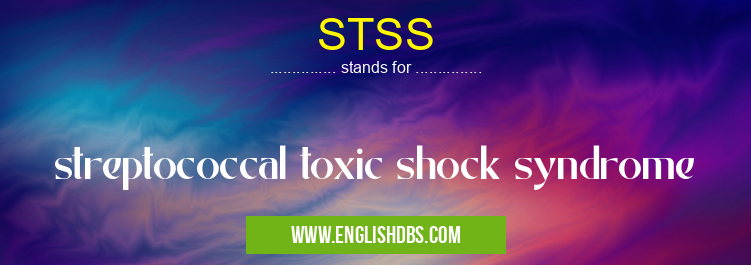What does STSS mean in BRITISH MEDICINE
Streptococcal toxic shock syndrome (STSS) is an infection caused by certain bacteria that produce toxins in your body. It can lead to life-threatening complications, such as organ failure and death. STSS is a rare but serious medical condition that requires immediate treatment.

STSS meaning in British Medicine in Medical
STSS mostly used in an acronym British Medicine in Category Medical that means streptococcal toxic shock syndrome
Shorthand: STSS,
Full Form: streptococcal toxic shock syndrome
For more information of "streptococcal toxic shock syndrome", see the section below.
Essential Questions and Answers on streptococcal toxic shock syndrome in "MEDICAL»BRITMEDICAL"
What are the symptoms of STSS?
Common symptoms of STSS include fever, chills, nausea, diarrhea, vomiting, rash, confusion, headaches, muscle aches and low blood pressure. These symptoms may appear suddenly and may worsen quickly if not treated promptly.
How is STSS treated?
Treatment for STSS depends on the severity of the infection and can involve antibiotics to fight the infection and medications to reduce swelling and inflammation. In some cases, surgery may be needed for removal of infected tissue or organs.
What causes STSS?
STSS is caused by various types of Streptococcus bacteria. These bacteria can enter the body through a wound or an area of damaged skin (such as burns or insect bites). The bacteria then release toxins into the body that cause an infection. This infection can spread throughout the body very quickly and cause damage to organs if not treated right away.
Who is at risk for developing STSS?
Anyone can develop STSS but certain people are more vulnerable than others due to underlying conditions that weaken their immune system such as HIV/AIDS or cancer treatments like chemotherapy or radiation therapy.
Final Words:
In conclusion, Streptococcal toxic shock syndrome (STSS) is a rare but serious condition caused by certain streptococcal bacteria releasing toxins into your body which require immediate treatment due to its potentially deadly consequences when left untreated. If you think you are at risk for developing this condition seek medical advice right away!
